Posting has been super light this week because I’ve been in Arizona with Bosch learning all about how to organize and effectively do my laundry. But I’ve come away with some great tips that I’ll be sharing with you soon! One of the things I learned was that the way we do laundry, isn’t a. the most effective and b. the most environmentally friendly. We have a top-loading washer (something I’m hoping will change in the next year or so) which uses a lot of water, soap, and energy. The average household does almost 400 loads of laundry each year, consuming about 13,500 gallons of water . I’m certain we do more than that with our two small children. So what can you and I do to get clean clothes naturally, without expending as much water and energy? Here are some tips to get you started:
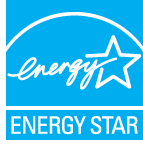 Look to the stars. Not only should you switch to an Energy Star qualified machine, it should be a front loading machine if you can afford it. Average savings: $50 a year…enough to cover the cost of the dryer if you use one. You’ll also save up to 7,000 gallons of water per year.
Look to the stars. Not only should you switch to an Energy Star qualified machine, it should be a front loading machine if you can afford it. Average savings: $50 a year…enough to cover the cost of the dryer if you use one. You’ll also save up to 7,000 gallons of water per year.
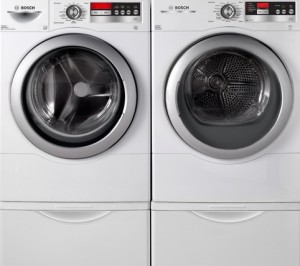 Opt for a front-load machine. Not only do they look marvelous, they’ll save time, money, energy, and water (up to a 40% reduction in water and energy). They’ll also get your clothes cleaner and eliminate many trips to the dry cleaners. Front-load machines do not have a central agitator so clothes tumble and flip, which means they’re exposed to more water and soap (and the result is that you require less of both). Clothes also spin two-three times faster during the spin cycle to extract more water which means less dryer time (Energy Star). Without a central agitator, you have more usable space (fewer loads overall) and a gentler washing cycle overall (which will prolong the life of your clothes and allow you to skip the dry cleaners). Bosch is the most efficient brand in the U.S. (more to come on their washers and dryers!).
Opt for a front-load machine. Not only do they look marvelous, they’ll save time, money, energy, and water (up to a 40% reduction in water and energy). They’ll also get your clothes cleaner and eliminate many trips to the dry cleaners. Front-load machines do not have a central agitator so clothes tumble and flip, which means they’re exposed to more water and soap (and the result is that you require less of both). Clothes also spin two-three times faster during the spin cycle to extract more water which means less dryer time (Energy Star). Without a central agitator, you have more usable space (fewer loads overall) and a gentler washing cycle overall (which will prolong the life of your clothes and allow you to skip the dry cleaners). Bosch is the most efficient brand in the U.S. (more to come on their washers and dryers!).
Fill it up. Your washer and dryer, that is. Front-load machines sense how small or large the load is and adjust their water and energy consumption accordingly. Top-load machines, like the one we have, do not. Washing and drying full loads ensures that the machines are operating as efficiently as possible.
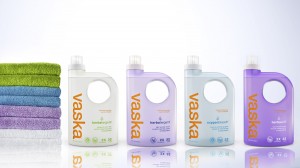 Choose a green detergent. Most conventional laundry detergents contain phosphates which negatively impact bodies of water. Opt for biodegradable, phosphate-free detergents made from plant- and vegetable-based ingredients. If you’re adventorous, you can DIY! I like Vaska’s herbatergents which use herbs and botanical cleaning agents and can be used on delicate fabrics. Their line of products are biodegradable, gray water safe and hypoallergenic. I like their lavender scented detergent. It’s gentle enough for my baby’s clothes and powerful enough to get the dirt and grime off of my toddler’s clothes. A 48 oz. bottle will wash 32 loads and retails for $9.99.
Choose a green detergent. Most conventional laundry detergents contain phosphates which negatively impact bodies of water. Opt for biodegradable, phosphate-free detergents made from plant- and vegetable-based ingredients. If you’re adventorous, you can DIY! I like Vaska’s herbatergents which use herbs and botanical cleaning agents and can be used on delicate fabrics. Their line of products are biodegradable, gray water safe and hypoallergenic. I like their lavender scented detergent. It’s gentle enough for my baby’s clothes and powerful enough to get the dirt and grime off of my toddler’s clothes. A 48 oz. bottle will wash 32 loads and retails for $9.99.
Wash in cold water. Because we are not ready to switch to a front-load machine, we try to wash in cold water when it makes sense. We already know that most of the energy consumed by the washer is related to heating the water. Opt for concentrated detergents specifically designed for cold-water washing.
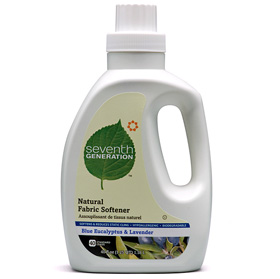 Ditch the dryer sheets. Most contain chemicals you don’t want on your skin (or your children’s skin). So how do you avoid stiff clothes and static cling? Add ½ cup of vinegar to the rinse water (in place of fabric softener). Or, try Seventh Generation’s Natural Fabric Softener or Natural Fabric Softener Sheets. While I have yet to try either product, I use many of the company’s other products and am always impressed with their safety and effectiveness.
Ditch the dryer sheets. Most contain chemicals you don’t want on your skin (or your children’s skin). So how do you avoid stiff clothes and static cling? Add ½ cup of vinegar to the rinse water (in place of fabric softener). Or, try Seventh Generation’s Natural Fabric Softener or Natural Fabric Softener Sheets. While I have yet to try either product, I use many of the company’s other products and am always impressed with their safety and effectiveness.
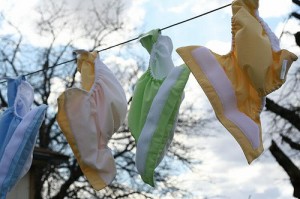 Line dry. Even if you only do this part of the time, you’ll still save money and energy (and extend the life of your clothes). At Bosch we learned that energy consumption is highest when heating the water to wash your clothes and heating the air to dry them. The dryer is second on the list (after the refrigerator) of appliances that consume the most energy (U.S. Department of Energy). So how do you avoid the stiffness associated with line-drying clothes? Check out Planet Green’s “laundry” list of tips! {photo credit: simplyla}
Line dry. Even if you only do this part of the time, you’ll still save money and energy (and extend the life of your clothes). At Bosch we learned that energy consumption is highest when heating the water to wash your clothes and heating the air to dry them. The dryer is second on the list (after the refrigerator) of appliances that consume the most energy (U.S. Department of Energy). So how do you avoid the stiffness associated with line-drying clothes? Check out Planet Green’s “laundry” list of tips! {photo credit: simplyla}
Avoid dry cleaning. Most conventional dry cleaners use perchloroethylene which has been linked to cancer, skin irritation and fertility problems. These days, I either avoid purchasing clothes that require dry cleaning or hand wash the items I already own. My husband still prefers to professionally launder his nice clothes so we use a “green” dry cleaner.
What else can you do? Simple things like wearing clothing more than once and taking clothes out of the dryer when they’re done (to avoid wrinkles and ironing) can help save you time and energy. Your clothes (and your wallet) will thank you.
I did not receive compensation for this post. Product samples were provided by Vaska and Bosch sponsored a trip to their facility.
- Discover Luxury at Sonesta Irvine: Your Ideal Staycation - August 8, 2024
- CHOC Walk Returns to the Disneyland Resort – Special Events and Ways to Support - June 28, 2023
- Beastly Ball Returns to the Los Angeles Zoo - May 8, 2023

That’s super interesting about the dryer sheets. I’ve actually been wondering about that…
I’ve actually never really used dryer sheets. The smell is way overwhelming…I don’t like strong scents…..I haven’t tried Seventh Generation’s but I’ve heard they work well. Also might try Shaklee’s….
It is great to see the chore of laundry finally greening up. I want to brag just a little. I have totally done away with my clothes dryer. I dry on clothes drying racks. If the weather is nice outside they go. If it is a rainy day, I simply wait until evening to do the laundry and I place the racks in the middle of the living room before bed. Turn on the ceiling fan and in the morning I have dry laundry.
Actually alot of the stiffness that is left on your clothes is left over detergent. If you run your towels through an extra rinse cycle and use a cup of white vinegar and shake your towels when you go to hang them up they will be much softer.